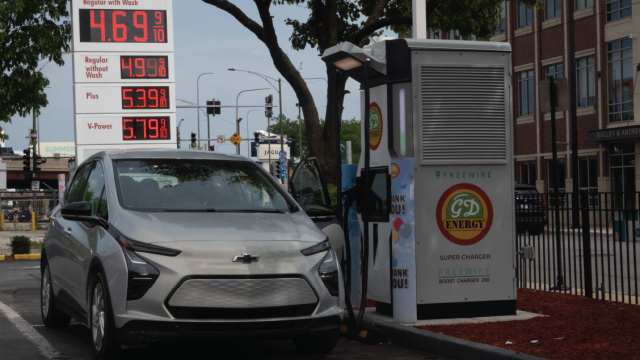
Electric vehicle sales continue to hit record highs, but the pace of growth in the United States has slowed for the first time since mid-2020. And a new Pew Research Center survey finds that only about three-in-ten Americans say they would very or somewhat seriously consider purchasing an electric vehicle (EV), down 9 percentage points in the past year.
Pew Research Center conducted this analysis to understand Americans’ views of electric vehicles. For this analysis, we surveyed 8,638 U.S. adults from May 13 to 19, 2024.
Everyone who took part in the survey is a member of the Center’s American Trends Panel (ATP), an online survey panel that is recruited through national, random sampling of residential addresses. This way, nearly all U.S. adults have a chance of selection. The survey is weighted to be representative of the U.S. adult population by gender, race, ethnicity, partisan affiliation, education and other categories. Read more about the ATP’s methodology.
Here are the questions used for this analysis, along with responses, and the survey methodology.
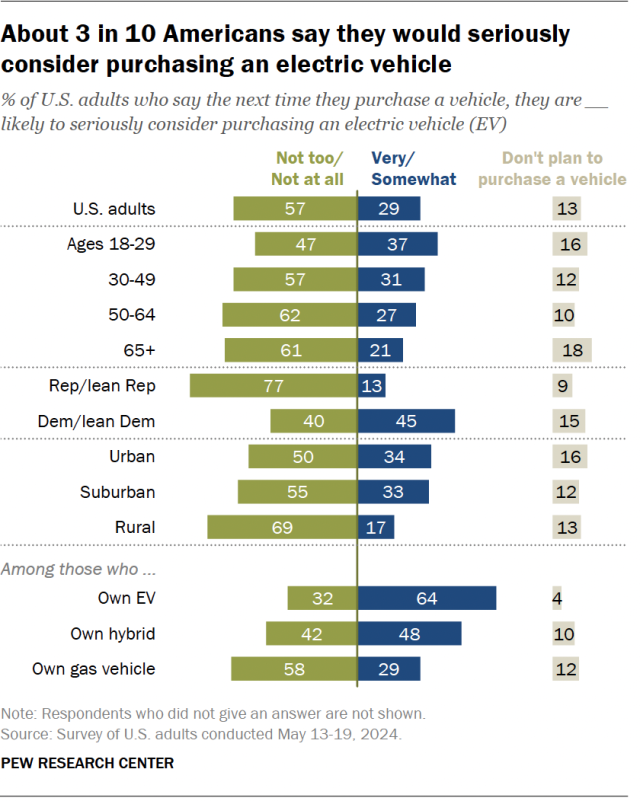
Amid this softening interest, we asked Americans about factors that could influence their choice of electric versus gas-powered vehicles: environmental benefits, cost, driving experience and reliability. We also looked at how confident Americans are that there will be enough EV charging stations and infrastructure to meet demand.
Related: How Americans View National, Local and Personal Energy Choices
Are EVs better for the environment than gas vehicles?
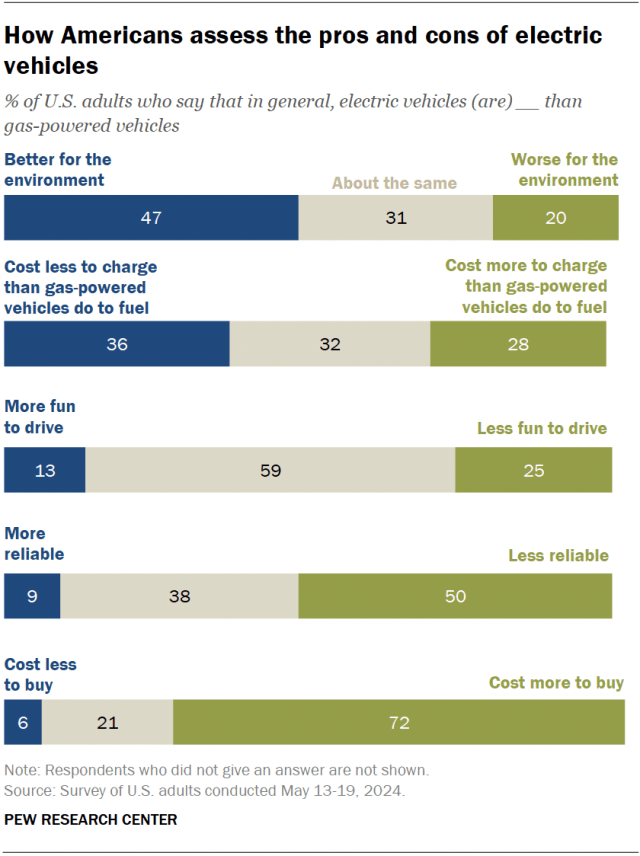
One area where Americans rate EVs more favorably than gas vehicles is their environmental benefits. Nearly half (47%) say EVs are better for the environment than gas vehicles. Smaller shares say they are about the same (31%) or are worse for the environment (20%).
However, the share of Americans who say electric vehicles are better for the environment than gas vehicles has decreased 20 points since 2021, from 67%.
Do EVs cost less to buy and to charge?
Most Americans say EVs require a bigger up-front investment to buy than gas-powered vehicles (72%). Industry data shows that the average EV still costs more than the average gas vehicle, though this gap is narrowing.
Americans are split in their perceptions of the cost of charging or fueling these vehicles. Some 36% say EVs cost less to charge than gas-powered vehicles do to fuel, while 28% say EVs cost more and 32% think the costs are about the same.
Are EVs more fun to drive?
EV enthusiasts tout EVs’ faster acceleration and quiet engines as selling points over gas vehicles. But in our survey, just 13% say EVs are more fun to drive than gas vehicles. More than half (59%) say the two types of vehicles are about equally fun to drive.
Are EVs more reliable?
Amid reports about problems some EV owners have encountered, such as battery issues and squeaky brakes, half of Americans say electric vehicles are less reliable than gas vehicles. That share is up 16 points from 2021. Only 9% say EVs are more reliable, while 38% say electric and gas vehicles are about equally reliable.
Differences by party
On every dimension, Democrats view EVs more favorably than Republicans do.
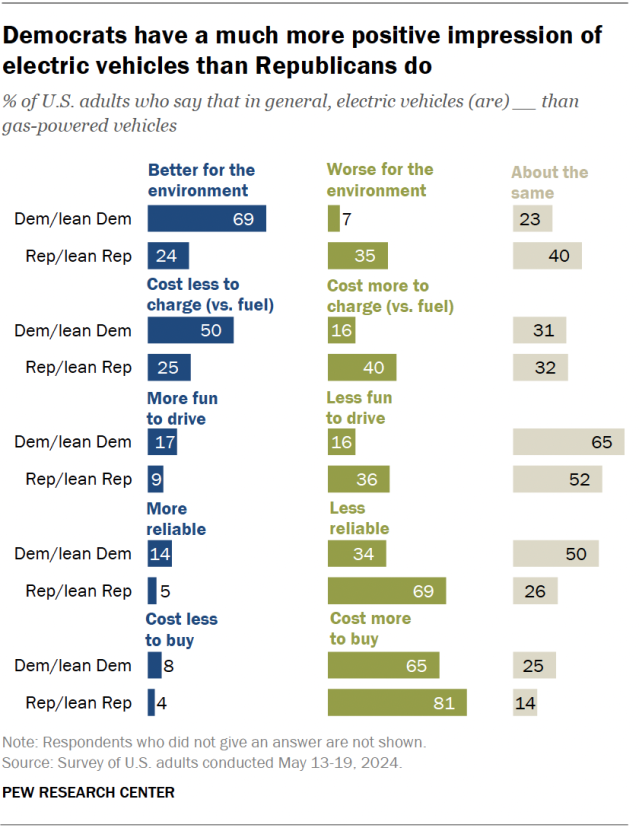
- Environmental benefits: Democrats and those who lean to the Democratic Party are much more likely than Republicans and GOP leaners to say EVs are better for the environment than gas vehicles (69% vs. 24%).
- Cost to buy: A majority of both Democrats and Republicans say EVs cost more to buy than gas vehicles. But fewer Democrats than Republicans say this (65% vs. 81%).
- Cost to charge/fuel: Half of Democrats say EVs cost less to charge than gas vehicles do to fuel. That compares with a quarter of Republicans.
- Reliability: Very few Democrats or Republicans think EVs are more reliable than gas vehicles, but Democrats are more likely than Republicans to say this (14% vs. 5%). Half of Democrats say EVs and gas vehicles are about the same on reliability, while 34% say EVs are less reliable. Republicans are even more negative, with 69% saying EVs are less reliable.
- Fun: Small shares of both Democrats and Republicans say EVs are more fun to drive than gas-powered cars, but Democrats are more likely to say this (17% vs. 9%). The most common view among both groups is that EVs are about as fun to drive as gas cars.
Hybrid vehicle sales have been increasing for the past three years, and our survey finds that Americans are more likely to consider a hybrid than an electric vehicle. Some 43% of Americans say they would seriously consider purchasing a hybrid, compared with 29% who say this about an EV.
Still, a sizable share of the public (42%) say they would probably not consider a hybrid.
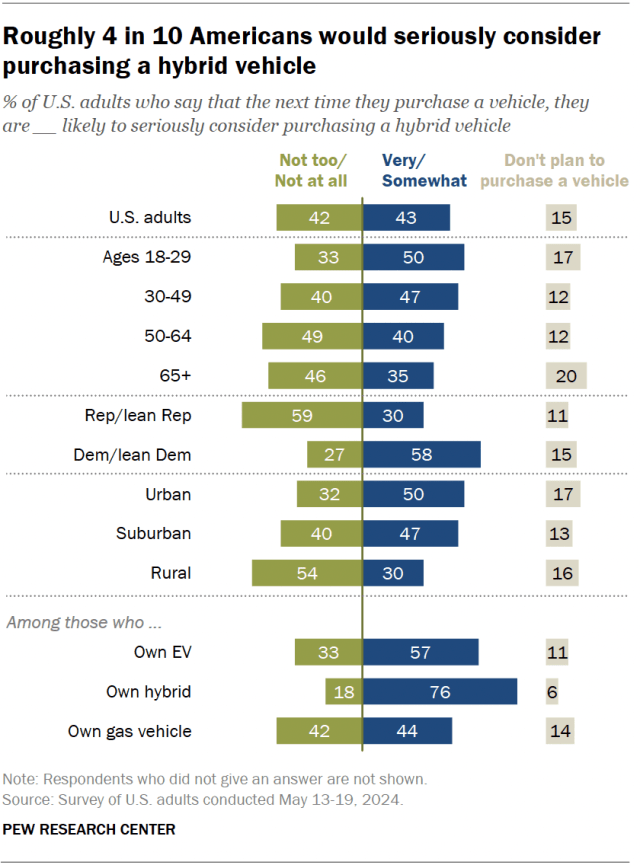
Will there be enough EV charging stations and infrastructure?
Concerns about limited EV charging stations and infrastructure are one factor that can hold buyers back from switching from gas to electric vehicles.
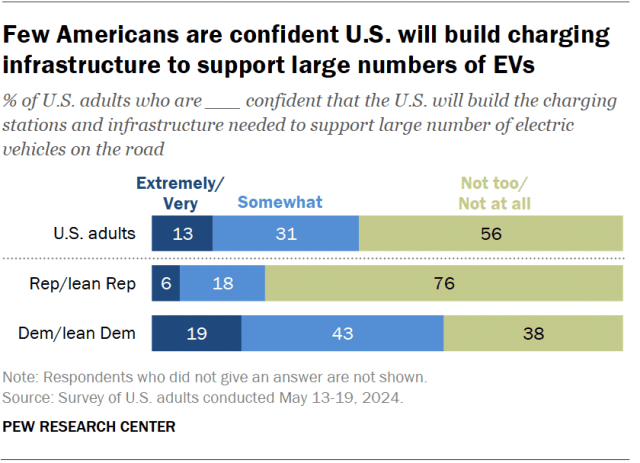
Overall, 56% of Americans are not too or not at all confident that the U.S. will build the necessary infrastructure to support large numbers of EVs. Another 31% are somewhat confident, while just 13% are extremely or very confident.
Republicans express strikingly low confidence in EV infrastructure. Only 6% are extremely or very confident the U.S. will build the necessary infrastructure, while 76% are not confident.
Democrats are more positive, but confidence is hardly widespread: 19% say they are extremely or very confident about this, while 38% are not confident. The share of Democrats who are extremely or very confident in EV infrastructure has decreased by 7 points from a year ago.
Illustrating the tie between infrastructure and interest, 58% of Americans who are extremely or very confident that the U.S. will build enough charging stations say they would seriously consider purchasing an EV. Only 16% of those who are not confident in EV infrastructure say the same.
Related: Electric Vehicle Charging Infrastructure in the U.S.
Note: Here are the questions used for this analysis, along with responses, and the survey methodology.
